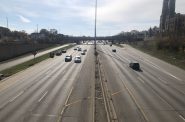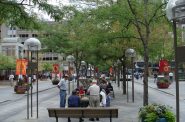How Traffic Noise Impacts Children’s Brains
All the city news you can use.
Every day at The Overhead Wire we sort through over 1,500 news items about cities and share the best ones with our email list. At the end of the week, we take some of the most popular stories and share them with Urban Milwaukee readers. They are national (or international) links, sometimes entertaining and sometimes absurd, but hopefully useful.
Retail vacancy spike: Even before the pandemic retail vacancies were high, but now they are increasing due to a number of factors including online shopping, empty offices in downtowns, and landlords that sit and wait for perfect tenants. Leah Brooks and Rachel Meltzer argue that the main culprit is that cities have required developers to build too much retail. Going forward, we should be more strategic about how we build retail so that it thrives. (Leah Brooks and Rachel Meltzer | Slate)
Highway expansions and climate change: Caltrans states that the agency believes expanding highways through toll lanes will reduce emissions by easing congestion. But highway projects are known to induce demand which allows critics to question whether California’s highway department and its elected leaders are actually serious about it’s long term climate goals. The results of a coming court case will likely set up how the state moves forward related to highway expansions. (Rachel Uranga | Los Angeles Times)
Traffic noise and children’s brains: Noise pollution has impacts on children’s health, particularly urban transportation noise that is the dominant source of pollution in both the US and EU. Studies show children’s cognitive function at important development stages can be impacted, particularly outside of places of learning. The best solution? Reducing vehicle traffic near schools. (Olivia Howitt | BBC Future)
Colorado’s innovative rental benefit: Colorado has set aside .1% of the state’s income tax revenue for housing programs across the state including a provision that gives renters “equity” each month from the housing they live in built by the program. The money comes from the debt paid by developers who borrowed from the state to build the units instead of lenders. (Roshan Abraham | Shelterforce)
Four day work week: A Barcelona Metropolis series on work shares the idea of moving to a four day work week in hopes of increasing the amount of leisure time people have, which in turn could boost civic participation and reduce emissions from transportation. They took note of a month in Valencia Spain in holidays in the month of April meant four weeks with four day work weeks. Nitrogen oxide pollution in the city decreased 58%. (Joan Sanchis I Muñoz | Barcelona Metropolis)
Quote of the Week
No, no, great job, you disintegrated our Death Star, the first-ever pedestrian-only planet. You drove a million miles just to ruin a perfectly lovely living space.
–Jack Stebbins in the satirical magazine McSweeney’s
This week on the Talking Headways podcast, we’re joined by Wes Marshall, Civil Engineering Professor at the University of Colorado at Denver to talk about his book Killed by a Traffic Engineer: Shattering the Delusion that Science Underlies our Transportation System.
Want more links to read? Visit The Overhead Wire and signup.
If you think stories like this are important, become a member of Urban Milwaukee and help support real, independent journalism. Plus you get some cool added benefits.
Urban Reads
-
Number of Super Commuters is Rising
 Jun 22nd, 2024 by Jeff Wood
Jun 22nd, 2024 by Jeff Wood
-
Why Has the Walkable City Been Villainized?
 Jun 9th, 2024 by Jeff Wood
Jun 9th, 2024 by Jeff Wood
-
What is a Groundscraper?
 Jun 2nd, 2024 by Jeff Wood
Jun 2nd, 2024 by Jeff Wood





















